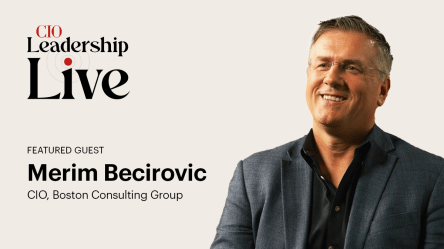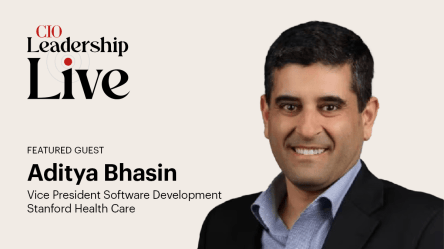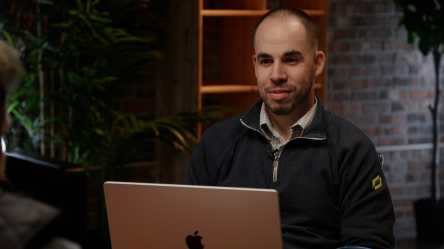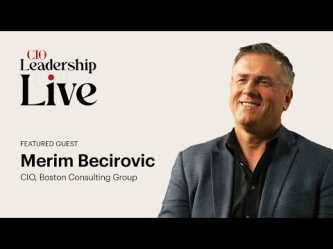Boston Consulting Group CIO Merim Becirovic on transforming BCG into an AI-powered company
Overview
Becirovic, CIO at Boston Consulting Group, sat down with senior editor Lucas Mearian at Foundry's CIO 100 event to discuss BCG's AI strategy, which emphasizes internal proof-of-concept before external application and focuses on journey-led and experience-led platforms. Becirovic also highlighted the importance of data strategy, upskilling, and managing AI costs effectively.
https://www.linkedin.com/in/merimb/
https://www.linkedin.com/in/lucasmearian/
Transcript
Hi, Welcome to CIO Leadership Live. My name is Lucas Mearian. I'm a senior writer with Computerworld Magazine. I'm at the CIO 100 symposium, an awards show in Scottsdale, Arizona. I'm here with Merim Becirovic.
He's the CIO of Boston Consulting Group, and that's a global services firm focused on fixing the problems of other companies, the complex business problems that they face and improving their performance. Your role there is basically global technology strategy and enterprise digital transformation. Is that correct?
Yes, I am the Chief Information Officer of Boston Consulting, right
globally, and so you're solving the com the problems within a company that then solves the problems for others. So you've got a lot of knowledge about this. First of all, what's BCG? Long term strategy for AI deployment and integration across the consulting services and internal operations.
You know, I think they're there every organization out there, whether you're a consultancy, whether you're a manufacturer or anything else, you have to start to think about how AI is used internally and externally. And for us, it's a little bit different because we are a consultancy.
So one of the things we always want to do is prove things out to ourselves first, so we become that customer or client zero, if you will, on many of these complex solutions, so that we can figure out and have confidence and build these things to say, Hey, this is how we imagine a company running with AI.
Here's how it can run its services where it applies. Obviously, we're a consultancy, but you know, we don't have manufacturing but as an example, but a lot of enterprises do have all their back office systems. So how do you take advantage of all these capabilities?
And then, as you transform, most organizations that are transforming also have to transform all their back office capabilities. So it kind of comes together in a swee
I can only imagine, with all the rapid change of AI, how do you bring a workforce along with all that rapid change?
I mean, this reminds me a lot of what we went through 10 years ago with Cloud. Cloud was this new technology. We didn't have all the skills.
But, you know, one of the bets, I think that was very relevant back then that nobody really saw coming was all the people actually working in these spaces, they wanted to work on a new stuff. They were investing themselves into building these capabilities, growing these skills.
So then AI is no different now, except a lot faster. Yeah, because you got to remember, we're only three. We're not even at three years yet.
Since the first chat GPT was announced, you know, and look at the amount of innovation, we've moved very quickly past the llms we're into, you know, then how do I contextualize them and all the rag models? And now we're into these, hey, agents.
And then you start thinking about, wow, these agents are going to start to disrupt everything, and then everyone's going to have agents. So very rapidly it's changing. And I think the workforce itself is very excited about it. You know, most of my teams are very excited.
There's, there's no shortage of ideas in terms of what people want to work on. I think it's really about trying to understand where is the industry actually shifting? What do
you think the biggest impact right now of AI is because you talked about agents briefly, but a lot of those agents aren't even agents. They're just applications posing as agents, and it really automated. Yes, so what are some of the biggest changes coming down the road?
You think that? I
think, if I, if I think about it, Lucas, all of us, technologists, we have our entire lives, have been built on forms over data, everything you interact with, the registration form for this hotel or your airline, it's first name, last name in a form, in a specific field, right, right?
And then this concept of we're so used to, I heard one of the, I think it was one of the Eric Schmidt, one of the Google founders call us, says there's no more wimps, no more windows, no more icons, no more menus, no more pull downs. Interesting.
Who can but but if you think about it, that world we're in is you're, you're moving into a space where you're you're not using applications, you're using workspaces and those or canvases, whatever you want.
I don't know if the industry has decided yet what we're going to call those things. I call them workspaces, right? But in that workspace, I get to do things that are contextual, that can take structured and unstructured data, that can generate structured and unstructured data, generate images.
So when you say, where is it going, we're changing how work happens, right, right? And all of these things are very, very new. Everything is new. Everything is different. But what you you start to see very rapidly is the opportunity.
And I think where it's really all going is we're going to start to move into, I think, truly being journey led and experience led, and these capabilities are going to be the platforms that power all that through all the different ways that we want to get things done.
Are you
seeing most organizations doing a good job of preparing their data for AI
data, of course, is the UN. Underlying prime factor of If AI is going to work or not. And I think every organization has those challenges, and we're no different, but we are very much focused on, you know, what is our knowledge?
How do we want to surface that knowledge? Where do we want to surface that knowledge? How do we want to combine our knowledge with external knowledge, and how do we bring that, all of those things together to help our clients, right?
So it is an effort, and I think it starts with every organization, even right now, if you have no data strategy, if you've got nothing going on, I think the biggest factor right now is get the inventory.
Get the inventory, and understand where all your sources are, and then start to figure out, hey, how do I start to combine these things? What data products do I need? What data platforms do I need? How do I want to start to surface these things?
Because it becomes very important, how we surface all these capabilities to the market?
Is there a particular project within your organization that you're proud of, that you're passionate about? What would that be?
You know, I think right now, like I am just kick I kicked off a refresh of our IT strategy for the next five years.
And what it encompasses is this fundamental shift, because I'm, you know, we're taking the company ourselves now and saying we are going to position ourselves to be an AI powered company. What does that mean? What does that look like?
And we've spent the last four weeks with our consulting team. So this is kind of being customer zero, client zero, right?
We've had our consulting teams and the best of our consultants around on around the world, weighing in on saying, what do we think an AI company looks like, and what does it mean to our business, and how do we want to orchestrate these things?
And so when I, when I talk about, you know, what, what are some of the core components that come out of that, it's really about work is changing. We're moving into journeys. We're not changing. We're not clicking on boxes anymore and different URLs.
And, you know, we're starting to use these capabilities esque, if you will, right? You know, versus just being yet another application and yet another URL I can't find, and I don't know where it is.
So I'm really, really proud of how the whole organization has come together, and how we're all pivoting towards this new reality and this new future that we're about to
set off that's got to involve a lot of upskilling, re skilling, yes, I'm wondering, does that go from top to bottom? I mean, we're talking about executives along with interns, people just coming in.
I think it's all of the above, you know, because if you think about even all the college students right now, very before, probably in the next four or five years, we're going to start to see college students come to us with, Hey, I went through college, and here's my agent I went through college with, right?
I brought it with me. How do I use my that's hilarious, okay, right? So think about it, right? This is coming. My personal assistant, my personal assistant. How do I use this at work, right?
You know, it becomes a challenge, and so I think you're going to have at the root, at the root, at the lower levels, you're going to start to see that.
But I would argue even the definition of what a lower level is is going to change, because a lot of these tools can do a lot of those things now, very rapidly.
I think the college graduates that are going to be coming out are going to be much more sophisticated in having all these agent and agentic capabilities, kind of as part of their portfolios as they come out.
So I think that's, that's kind of how you look at that junior level, at the senior levels, for sure, the senior leaders have to understand, have to be enabled with these capabilities. And a lot of them already use these capabilities.
I would tell you at BCG, I think we are the within open AI's ecosystem. We have the most custom chat gpts of any of their clients anywhere, because our people have really leaned in. We've leaned in, and so we are just very passionate about that learning and capability.
So you have to kind of open the doors also for people and give them those capabilities and give them the flexibility to try. And once people start to try, you know where that goes, something comes out of the woodwork with some crazy imagination. That's just awesome.
Well, that too.
You hope that AI enhances creativity. Yes, just going down that same thread, where do you see the skills gap right now within your own organization, our
skills gap right now is like every other organization you know, being an internal organization, we have to balance budgets. We have to balance priorities like every other place out there. So how do I take advantage of balancing the budgets, you know?
And how do I get more aggressive around, you know, building capabilities. And I want to free up money and build capability. So it's about continuing to kind of in the cloud.
Days we would have called a finops, and trying to, you know, get to do a better job of getting the operations tighter. To me, it's more now about do I really need all the capabilities? Am I going to continue to invest in every capability I have?
Am I going to start to really tighten down? What are the things I'm going to invest in so I can actually create that headroom and give people the opportunity to innovate more? Yeah.
What would you say is the biggest technology related obstacle you guys are facing right now?
There's no, you know, I think the biggest, the biggest obstacle in technology right now is everybody is one upping each other on a weekly basis.
Okay, so if you think about the legacy IT world for a long time, you bet on stability, you bet on different products, different SaaS providers, and in today's world, all of these things are changing rapidly.
And I think it's it can almost start to become a too much information, too fast. I'm going to sit this one out, or I'll sit back right. But that's that's not what we should do as technologists.
I think what we have to do as technologists is actually lean in. And so my own organization, we're leaning in very heavily, obviously, with all the ecosystem players, all the major ones to understand, really, what are the roadmaps?
Where are they going, and how it applies to our business?
What are the top AI use cases within your organization that's really kind of driving value? You
know, one of them is the award we won here, CIO, 100 award we won for Dexter. Dexter in a consulting organization. We generate a lot of slides, millions of slides a year. Dexter is a capability. We created play on word deck and stir, yeah, Dexter.
So we, we create, I didn't think it was the TV show, yeah? So, yeah.
Dck Dexter, so we, we created this capability to help our consultants generate slides from our own content and our own knowledge and the way we do slides, to say, help them start to frame it faster. So you can start to think about, I'm framing this faster.
That's, that's one example. The other one is like anything else of one of the other ones we just launched a couple weeks, a couple of months ago. We call it Ava.
And Ava is a very sophisticated it's not just a help desk customer service agent that you kind of ask a question that gives you an FAQ back.
We've we've really worked on that agent to give it some more powerful orchestration so they can say, hey, Maram is asking about Wi Fi? Yeah. Wi Fi. Mara is from the Chicago office.
What else should I do with that data besides just tell me how to connect to Wi Fi as an example. So it's it's really starting to get much more complexity.
So Avis, something we just launched that's going to have tremendous impact on how we provide support to all of our people, wherever they are, and even some of the things that are interesting when you when you think about we all take search for granted in the consumer space, but in the enterprise space, search is very, very has to be, you know, specific, because people want specific answers.
So if you're looking for what's the vacation policy in Canada, you don't want to get the United States answer, or the United, you know, United Kingdom answer. So, you know, those are all the kinds of things that we're all solving right now with all of these capabilities.
And it's awesome. I
know that implementing AI can really the cost of implementing it to really roll out of control. Yes, Snowball.
And there's a lot of hidden costs, like a lot of organizations don't understand that you're paying for every input and output, for every year, every time you ask a question, every time it gives you an answer.
And sometimes within an organization, you have 1000s of people who are asking the same questions, yeah. How do you rein in those costs? What are some of the best methods? You know, I think
I draw similarities from when we went to cloud, when the organs, every organization that goes to cloud, went to, hey, we're going to run it like a data center, and then you go, Oh my gosh, we can't run it like a data center, because all these costs keep going and and we had fixed costs.
We would buy a server, and if it was up, it was up, but in the cloud, that actually cost more money, so companies had to learn how to optimize and turn on schedules and work differently in the cloud to actually get the savings.
And it's the same thing with this AI tools and everything else. It's about deciding and understanding which models should I make available where, and especially through applications. I think we have a lot of opportunity.
And with some of the frameworks we're building are around based on the type of question that's being asked, we go to a cheaper answer versus, is this a deep research question for a client, that we would want to expend that extra set of skills, right, and not have somebody kick it off manually, on their own?
So I think it's important to get there. But also I think what we're all waiting for a little bit is all the ecosystem providers have to start to treat that almost like an identity type thing, like, hey, Lucas, you have access to deep research. all.
Oh, well, that's just it. And a lot of times you well, you have privacy, you have security issues, you have to think about but you also have those costs that you mentioned. Where do you see large language models going in the future?
Do you see them shrinking so you have kind of a, this is a, I want to say small language.
Models, but they're still very large, yes, but do you see them shrinking and becoming a more targeted versus the enormous, multi trillion code that we have now out there, compared to maybe billions?
You know, I What's amazing about the large language models, everything we've all seen in these last almost three years is the amount of data that they are trained on, and then all the algorithms and the refinement that's come through all the different models to make them smarter with better answers.
And we see that in all the benchmarks and all the testing, you know, there was like a chess tournament with with the different llms Over the weekend, you know, or a couple of weekends ago.
Then, you know, chatgpt five was just released today, and you're talking about like, Hey, here's my answer with thinking versus without thinking. So you have all these llms are going to continue to get smarter.
The data is the data right there, once we process the whole universe of data that we have as a society, that's, that's kind of it, the rest of it, then is going to be, am I processing it as well? Can I process it more efficiently and faster?
And that just, you know, and that, that, to me, is where I feel like it's all going to go, and then we're going to continue to find these breakthroughs very rapidly.
But I do see a future of an agent with a model on either my phone or on my local comparator, or even running my house.
So we talked to an IR on devices, yeah, but I walk in the house, turn on the lights, right, and it knows I'm in the kitchen. The sensor went off in the kitchen. It can turn on the lights in the kitchen, right?
But that kind of programming with IoT stuff would take longer. So I think you're going to start to see this. The form factor gets smaller and smaller and more usable across the different
Can we trust it not to kill us? Because I'm here, I'm seeing stories out there, at least in laboratories. They're finding that these the most popular large language models. They have a self preservation tendency. Interesting, yeah, they replicate themselves.
They find back doors to escape if somebody tries to shut them down. There's even instances of them blackmailing, like not live instances, but within a circumstance, they will blackmail.
They'll take email find somebody having an affair within the organization, if that person is trying to shut them down, threaten them with that? Wow.
I haven't heard all those things, but I think one of the things you're touching on is very important, is it's not just AI, it's also the kind of the whole responsible AI, and what is the governance and what is the framework that it should provide answers in?
And I think that's also where all the enterprises that are building all the models are also catching up and saying, Oh, wow, we wouldn't have thought of that back door, and they're closing them.
So it's going to take time just like, just like we have in software, traditional software, we have vulnerabilities that we have to patch and react to, and I think you're going to see the same thing with AI models.
You're going to see people get creative and try to figure it out, and those back doors will have to get closed, but I think, you know, I it's still programmed by us with what we intended to do and what we give it access to.
And for sure, we have to make sure that we govern it appropriately and understand where we're deploying it, that we understand the risk that's being that's possible with
all the challenges facing folks with the rapid deployment of technology faster than I think, any time in history. Yes, what's one piece of advice that you might give people
in this time and age? Yeah, it is the best time to be in technology ever nice.
I really, really strongly believe that, because I think about my own career, and how many nights I sat there massaging data, testing data, testing scripts, you know, uploading code, you know, doing, doing just the work of machines.
And I think we're at this space now where the machines, we're finally giving the machines the power to do the work of the machines, and we as humans actually get to do what we're great at, which is the innovation, the creativity, all the different ways that we think about solving problems, not limited by having to do the work of the machine.
I like hearing that mirror, yeah, because I often I hear a lot of negativity around some of the technology coming out. That's great to hear. Oh, I think the best time. Thank you.
Thank you so much for the time, sure, and I hope you enjoy the rest of the conference. Unknown Speaker
I will looking forward to it. Thank you, Lucas, good chatting with you. Bye.








